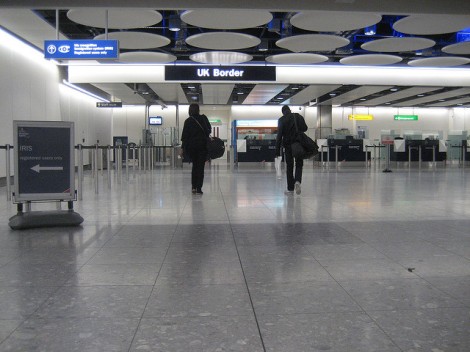Vivek Santayana | October 23, 2017

Image: https://www.flickr.com/photos/dannyman/4672474943/ Image is CC-BY, Danny Howard. I wanted to take a picture of the border myself, but you’re not allowed to.
International students have a lot of hoops to jump through. In keeping with its sponsorship requirements, the university has been monitoring my attendance to all my classes very strictly ever since I was an undergraduate. I am required to attend a census of students on a Tier 4 visa every couple of months. I have had to pay £700 upfront as a mandatory NHS surcharge as part of my visa application. Moreover, landlords in England are required to check the immigration status of their tenants prior to letting to them. This hasn’t been rolled out to Scotland officially yet, but that doesn’t stop letting agencies from asking me to give proof of my immigration status, arbitrarily charging me twice the stipulated deposit on a flat, or simply choosing to let to a British citizen instead to avoid any hassle. Starting January 2018, banks will start monitoring accounts and freezing those held by people whom the Home Office identifies as overstayers. All of this is in line with the Home Office’s policy to create a ‘hostile environment’ for immigrants in order to curb irregular migration.
This hostile environment is nothing new: immigrants and international students have fewer rights and opportunities than British citizens to begin with. Now, this discrimination has invaded even more corners of our lives. I am not going to complain about the opportunities that are closed to me as this is a daily cause of frustration, nor am I going to lament the many friends and colleagues who have been compelled to leave the UK or have had their families torn apart due to these policies as it is too painful for me to dwell on. Those more vulnerable to these hostilities, like asylum seekers or families with ambiguous immigration statuses, have faced much greater oppression than I have as a student. Here, I am going to highlight a subtler and more worrying shift that is taking place in Britain’s immigration policy.
There was a time when it was clear who the oppressor was: the police, the Border Force, immigration officers, people in uniforms who drove around in vans taking overstayers to detention centres. This is what Louis Althusser, writing in 1968, called the ‘repressive state apparatus’[1], or that arm of the state that asserts its control through force. Now, nearly fifty years later, the ground has shifted. It would be inaccurate to call this a police state because it is no longer just the state that is doing the policing: private agents are now also monitoring my immigration status on the state’s behalf. This is in line with the broader Conservative ideology of smaller state and greater autonomy for private actors. Tutors at university, landlords, employers and, pretty soon, bank tellers will keep tabs on people’s immigration status and their right to remain here.
It is sometimes possible to make a stand against a system. Some of my colleagues have, in the past, overcome the obstacles posed by the Home Office thanks to immigration solicitors, adequate financial means to make sustained appeals, support from friends and family, and a sound knowledge of immigration policy. But one cannot make a stand against a whole ‘environment’ where everything conspires against you. As Hannah Arendt has observed, the diffusion of oppressive control through these kinds of bureaucracies is effectively a ‘tyranny without a tyrant’ where one is fighting the battle on multiple fronts simultaneously[2]. Imagine trying to appeal an immigration decision when being evicted from your flat, having your bank account frozen and being terminated from employment. The cutting off of one’s financial resources is particularly pernicious: it prevents one from accessing legal recourse to defend one’s rights.
This policing is ubiquitous: just like the frigid winter in Scotland, this chilling climate of British immigration policy will soon pervade every aspect of our lives, work, study, relationships, and more. As a result of these new measures, private individuals and institutions are being co-opted by the state. Navigating one’s precarious survival through this means going through an elaborate and bewildering system whose insidious mechanisms are obscured. And I cannot help looking at all these hoops that I need to jump without the debilitating dread of being tripped up and falling.
Update:
As of 24 October 2017, the University’s Immigration Compliance department has announced that following a review of institutional monitoring practices by the Home Office, the Tier 4 Visa census will be discontinued from the 2017-18 academic year. Instead, the University will only be monitoring academic engagement through attendance at courses or supervisory meetings.
About Vivek
Vivek is a doctoral candidate in English Literature at the University of Edinburgh, writing on the late style of Nadine Gordimer. Even though he’s not from Edinburgh, he finds himself most at home in this city. He enjoys nothing more than learning.
Edited by Valentina Paz Aparicio, Anna Kemball and Penny Wang.
Works Cited:
[1] Althusser, Louis. Lenin and Philosophy and Other Essays. trans. Ben Brewster. London: New Left Books, 1971. Pg.131-2.
[2] Arendt, Hannah. On Violence. San Diego: Harcourt Brace Jovanovich, 1969. Pg.81.

This is a great piece! The bit that says ” private agents are now also monitoring my immigration status on the state’s behalf” made me wonder whether there is, right now, any true difference between these actors. Specially because the entities that are allowed to check your papers are entities like banks and companies that hire you. It is interesting to see how the “Conservative ideology of smaller state and greater autonomy for private actors” has, in a way, ended up blurring the distinction between state and private entities (through this regulations and, of course, through the privatisation of everything).
LikeLike